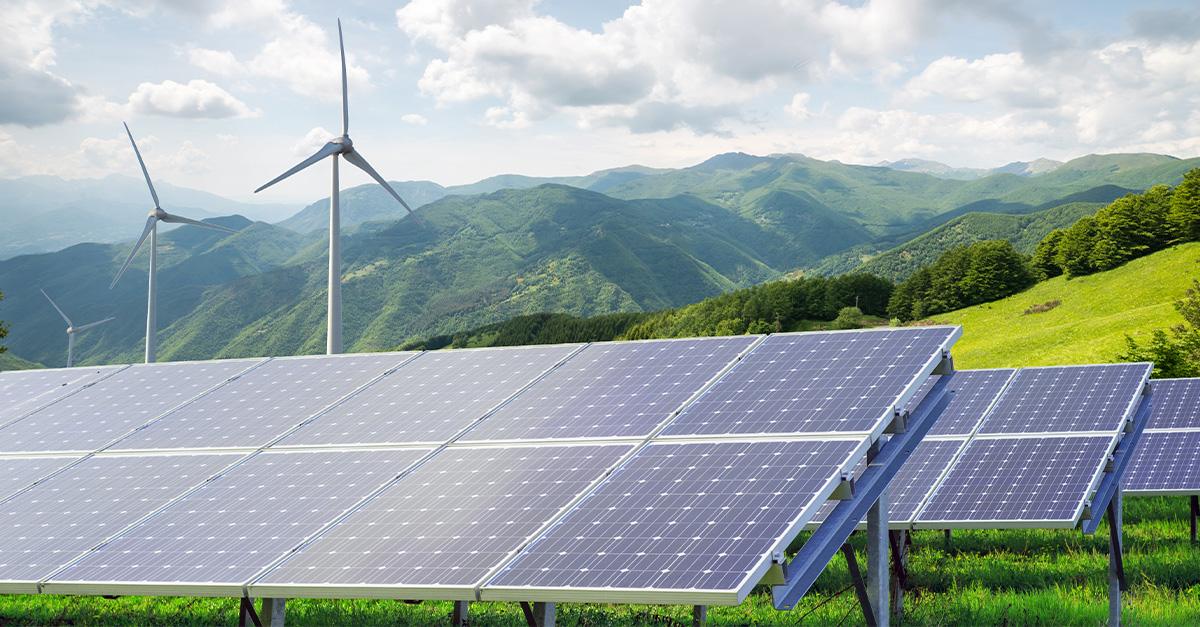


Get a free copy of Parental Rights & Education when you subscribe to our newsletter!

“At the end of the day, Christians can steward and enjoy the good-but-cursed earth, as we know that God has given us everything in creation to be used for our good and His glory. And yes, that includes plastic straws and big trucks.”
–WILLIAM WOLFE
Read part 1 of this series here.
Let’s go back to Genesis 8 and 9.
When Noah and his family disembark from the ark, they offer sacrifices to God. In response, at the end of Genesis 8, we learn that God commits in “his heart” the promise that gets more fully developed and announced to Noah in Genesis 9.
In Genesis 8:21-22, we read that
“The Lord smelled the pleasing aroma and said in his heart: ‘Never again will I curse the ground because of humans, even though every inclination of the human heart is evil from childhood. And never again will I destroy all living creatures, as I have done. As long as the earth endures, seedtime and harvest, cold and heat, summer and winter, day and night will never cease.’”
If God has willed that the earth will endure, it will endure. This verse is an insight into the mind of God Himself. It’s more reliable than all of the best climate models, in all time, put together, forever. It’s a covenantal promise — the earth will endure.
Moving into Genesis 9, God re-issues the Dominion Mandate and gives “everything” on the earth to Noah and his descendants, God announces to Noah the promise He had made to Himself in Genesis 8: As long as the earth endures, He will never again destroy it by a flood. God makes “a covenant for all generations to come” that “Never again will the waters become a flood to destroy all life” (Genesis 9:12, 15).
Christians are people who take God at His word. God has promised the earth will never again be destroyed — so we should live and act like that’s true because it is.
The earth, in its current form, will only end when Jesus returns. It won’t end with a flood from rising sea levels. It won’t end from a heatwave caused by global warming. It won’t end because we drill too much oil or drive big trucks or because cows and sheep are burping in New Zealand.
Now, to foreclose one line of response to this: Of course, it is theoretically possible that there could be a man-made catastrophe to the environment. One example might be a nuclear war.
But that theoretical possibility doesn’t mean we should therefore disobey the Dominion Mandate and fail to use the resources God has given us on (and in) the earth to produce life-saving and life-improving electricity, modern technology, cars, etc.
This world will be brought to an end when God decides that it is time, and not a moment before. Our stewardship of the planet may, in fact, be the divinely ordained means by which the earth endures. Therefore, Christians can ignore the climate alarmists and the doomsday prophets (who keep getting it wrong). Instead, we can work, daily, to love God and love others until Christ returns or calls us home.
While God commands humanity to take dominion of creation, that doesn’t mean mankind should just do whatever it wants, however it wants, with the earth. Ultimately, how we steward the planet and its natural resources is a part of loving our neighbor (Mark 12:31).
I’ve used the term “climate” throughout this article so far, but a much better term to use is “environment.” The climate simply refers to “the weather conditions prevailing in an area in general or over a long period.” There is little to nothing that mankind can do about the weather.
The environment, however, is “the surroundings or conditions in which a person, animal, or plant lives or operates.” This refers to the natural world that we inhabit — the land, water, and air that we live in, cultivate, grow crops on, build on, preserve, etc.
Christians should care for creation and the environment in a wise and purposeful fashion. This is called stewardship. Working for clean air and clear water, responsible land usage, and the preservation of natural wonders, such as our national parks, are good ways for us to use and even enjoy the gift of God’s creation and the handiwork of His creative genius.
The Cornwall Alliance for the Stewardship of Creation puts it like this: “Environmental policies should harness human creative potential by expanding political and economic freedom, instead of imposing draconian restrictions or seeking to reduce the ‘human burden’ on the natural world.”
The Cornwall Alliance is correct. The purpose of good stewardship is to serve humans well. Again, the planet has been made for us to live on, use, and enjoy.
Thoughtful Christian stewardship will therefore embrace an appropriate use of natural resources, like oil and gas. To refuse to drill for oil is arguably poor stewardship. At the same time, stewardship will include a willingness to explore alternative energy options such as nuclear, wind, solar, and renewables, as long as such energy options can stand on their own two feet economically and provide provable benefits for humanity.
Cultivating and caring for the land that God has given us — or you, if you are a landowner — is a way that we, as image bearers, display God to a watching world. Christians can both reject climate alarmism while embracing their responsibility to help care for creation, because by caring for creation, we care for one another.
Finally, Christians must be wise. Consider what the Secretary-General of the United Nations, António Guterres, recently stated:
“Half of humanity is in the danger zone, from floods, droughts, extreme storms and wildfires. No nation is immune. Yet we continue to feed our fossil fuel addiction. We have a choice. Collective action or collective suicide. It is in our hands.”
Look at the absurd rhetoric: “collective suicide.” It’s rhetoric like that which provides would-be dictators and petty tyrants the thin veneer of moral urgency they need to implement increasingly fascist, communist, or other totalitarian-like policies that rob people of their self-determination and fundamental freedoms.
These policies will be smuggled in under the umbrella of “Environmental, Social, and Governance (ESG)” activism, promoted by globalist entities like the World Economic Forum (WEF).
We are seeing this happening already, and in real-time. In June 2022, Dutch farmers revolted against such climate change tyranny. Fox News reported that the “Dutch government issued a plan in June laying out nitrogen emission reductions, largely targeting the nation’s agriculture industry, which produces an outsized shared of such emissions, according to a report from the U.S. Department of Agriculture’s Foreign Agricultural Service (FSA). The government, though, directly acknowledged that ‘there is not a future for all’ farmers to continue their business under the proposal.”
In other words, the Dutch government is saying, “We must slash nitrogen emissions, and in order to do that, we are going to shut down farmers.”
The farmers didn’t take too kindly to this nonsensical policy, and rightly so. This was a direct threat on their means of putting food on their families’ tables. As of July 2022, they were still protesting, in large numbers, across the nation. After all, it’s not just the farmer’s livelihood and land at stake, it’s also the product of that livelihood and land, namely food. The Netherlands isn’t just some tiny, polite country being used as a petri dish for testing out radical climate ideas. It’s the second largest exporter of agricultural products in the world after the United States. If this policy takes hold, the potential ramifications on food insecurity and outright famine are potentially catastrophic.
It’s anti-human policies like these that Christians must be prepared to resist. The reality is that there is no climate crisis to solve, and so policies that destroy people’s lives and livelihoods under the false ruse of “solving a crisis” are immoral and should be opposed by Christians everywhere.
Despite being one of the global leaders in carbon emissions, China’s communist governing structure has been held up, even by U.N. officials, as a model for what is needed to fight climate change. Christiana Figueres, executive secretary of the United Nations Framework Convention on Climate Change (UNFCCC), “came right out and said it: Democracy is a poor political system for fighting global warming. The really good model is communist China.”
Or consider comments much closer to home. “Can’t afford gas? Buy an electric car” is truly this moment’s “Can’t afford bread? Let them eat cake.” It’s a condescending luxury belief being foisted on the working class in our country, who get hit hardest by gas prices.
Another thing that Christians need to watch out for is how the COVID tyranny was a trial run for climate tyranny. If Biden does declare an emergency, what will stop him from using government power to limit your own electricity use via rationing? Or your water use? We must be on guard against this.
As Christians consider how we can think biblically about climate and environment issues, it’s important that we recognize the bad actors who simply want to use this issue as an excuse to establish tyrannical forms of government around the world.
We hope this two-part series has helped you, as a freedom-loving Christian, to think more biblically about climate change and the environment. We should bring a biblical worldview to all of the hot-topic issues, and this one is no exception.
As I tweeted last week: “Christians need to get smart and biblical about rejecting ‘climate crisis’ rhetoric. It’s a total hoax that is being used to push one-world, WEF-style, global governance.”
My hope is that this piece has helped you do just that. So, to recap, we provided five basic biblical principles for considering climate issues. Christians need to know and remember that:
Beyond that, Christians should be careful to not get swept up in the irresponsible messaging and rhetoric surrounding this issue. We should use good resources like the Cornwall Alliance or other scientists like Bjorn Lomborg and his book False Alarm: How Climate Change Panic Costs Us Trillions, Hurts the Poor, and Fails to Fix the Planet.
At the end of the day, Christians can steward and enjoy the good-but-cursed earth, as we know that God has given us everything in creation to be used for our good and His glory. And yes, that includes plastic straws and big trucks.
Follow William on Twitter! @William_E_Wolfe

Notifications